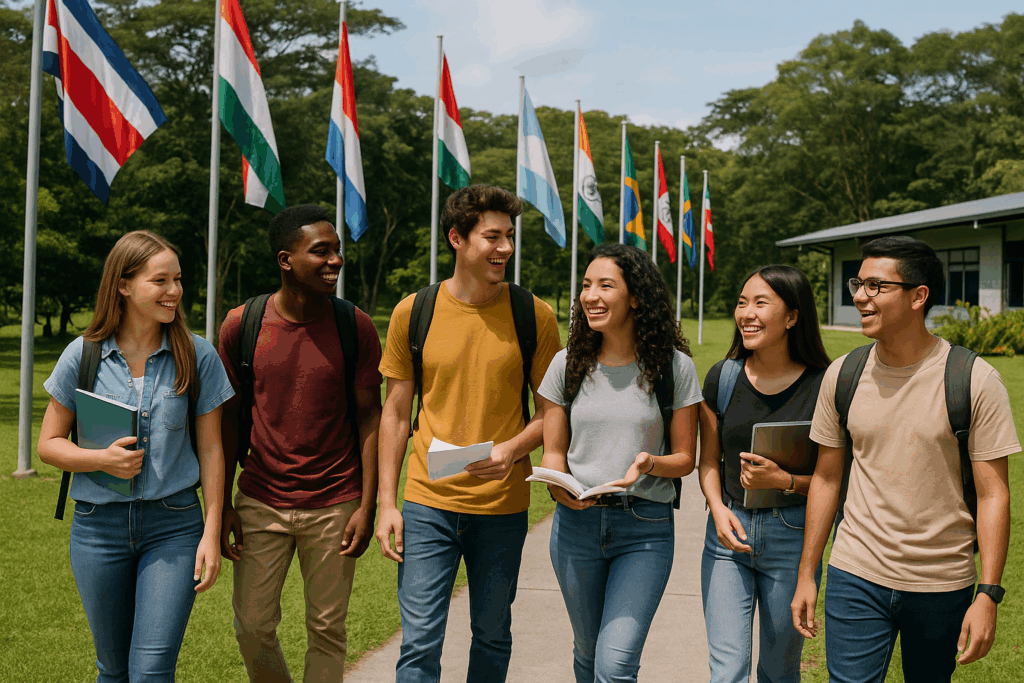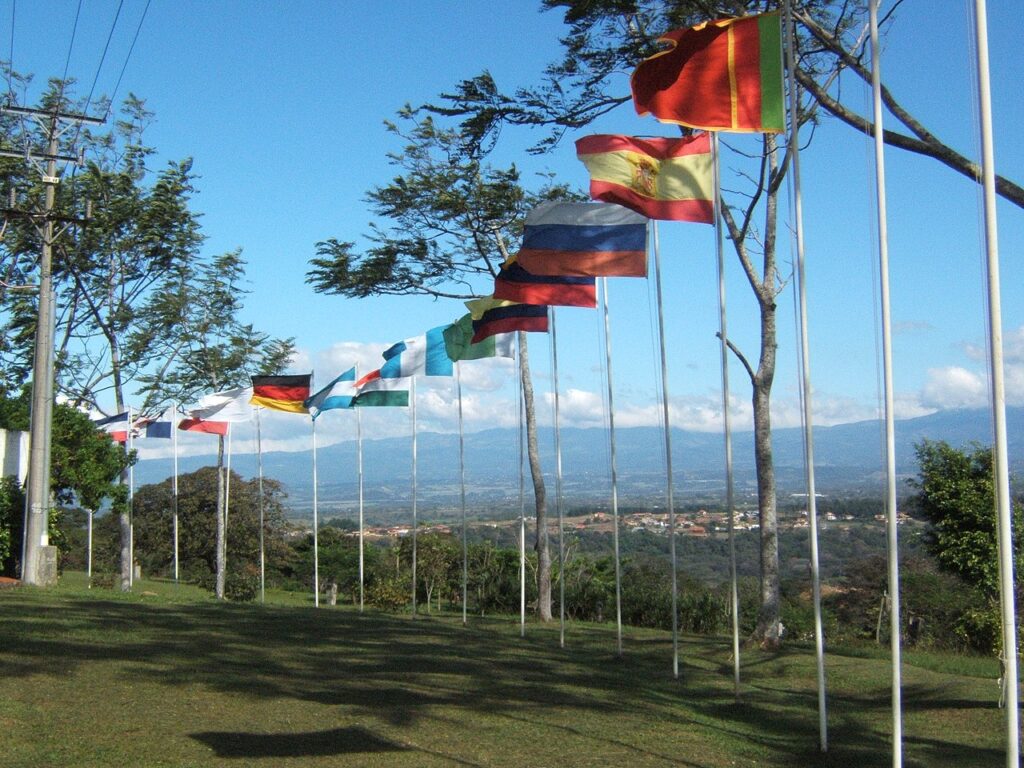Bachelors Programmes
- Home
- Bachelors Programmes
Bachelors Programmes


Our Bachelor of Sciences Programmes
Our new and upcoming Bachelor of Sciences (B.Sc.) programmes at the University for Peace constitute an important step in expanding our institutional mandate and embedding peace education at the undergraduate level.
These distinctive degrees are designed to equip a new generation of students with the knowledge, skills, and values needed to become effective peacebuilders and global citizens. With specialisations in key areas such as Natural Resources and Food Security, Artificial Intelligence and Peace, Business and Sustainable Development, and International Law and Peacebuilding, the B.Sc. programmes provide an interdisciplinary foundation grounded in academic rigour, ethical leadership, and global responsibility.
Offered on our campus in Costa Rica, our undergraduate pathways open the door to high-impact learning experiences that combine theory with real-world application. Through collaborative research, community engagement, and intercultural exchange, students will strengthen their ability to analyse complex global issues and to contribute constructively to peacekeeping, sustainable development, and social justice.
These new programmes mark the beginning of a lifelong journey in peace education, starting at the undergraduate level, where curiosity, critical thinking, and cross-cultural understanding become the cornerstones of academic and personal growth.
To train professionals in four areas:
- Bachelor’s Degree in Sciences with a specialisation in Natural Resources and Food Security.
- Bachelor’s Degree in Sciences with a specialisation in Artificial Intelligence and Peace.
- Bachelor’s Degree in Sciences with a specialisation in Business, Sustainable Development and Finance.
- Bachelor’s Degree in Sciences with a specialisation in International Law and Peacebuilding.
These degrees aim to cultivate new talent capable of developing the necessary competencies—both global and specific—with awareness of cultural diversity, the impact on different forms of life, individual and civil human rights, and shared responsibilities within the global system.
The programme is designed to provide comprehensive education, centred on social and environmental responsibility, innovation, development economics, peace promotion, and academic excellence. Graduates are expected to become agents of change who can analyse, understand, and transform their environment through critical, ethical, and reflective thinking, and the application of multidisciplinary knowledge. Additionally, respect for cultural diversity and the construction of fairer, more inclusive societies are promoted, framing each educational experience within universal values of cooperation and commitment to the common good.
The aim is to educate professionals committed to improving and preserving the planet, fostering global harmony, conflict management, and the promotion of peace. This will address the specific demands of each major and meet the needs of various state and social actors.
To develop generic and specific competencies, both theoretical and methodological, within the four Bachelor’s programmes mentioned, enabling professionals to impact the realities in which they work and contribute to the advancement of the Sustainable Development Goals (SDGs) of the United Nations Future Agenda, as well as national goals in the countries involved.
The curricula encourage the integration of practical experiences in real-life contexts, allowing students to consolidate their learning and strengthen their skills through teamwork, research, and engagement with local and international communities. Intellectual curiosity, openness to intercultural dialogue, and a willingness to collaborate in interdisciplinary networks are especially valued—key qualities for addressing the complex challenges of contemporary society.
The programme places special emphasis on systems thinking and responsible resource management, promoting social and technological innovation as drivers of progress for sustainable development. Graduates will be able to combine knowledge from various disciplines, applying integrative approaches to design and implement creative solutions to global and local problems, always from an ethical perspective committed to equity and peace.
To promote learning processes in which future professionals incorporate scientific and technical elements; apply them within a framework of human development that ensures environmental protection, ecological balance, and both regional and global peace and security, in line with national stability requirements as foundational components of peace.
To participate in the design and implementation of basic research, as well as the planning of innovative projects across diverse contexts and organisations at both national and international levels.
To apply emerging technologies relevant to their area of study.
The University for Peace – within the framework of its mission “to promote among all human beings the spirit of understanding, tolerance, and peaceful coexistence, to stimulate cooperation among peoples and to help lessen obstacles and threats to world peace and progress” – advances the development and teaching of knowledge in the key pillars of the United Nations: Peace and Security, Development, and the Protection of Human Rights. The universal design for learning (UDL) is considered in the different capacities for learning across the various specialisations.
The curriculum design involves not only knowledge acquisition but also the development of cross-cutting skills that enable students to adapt to changing environments and respond effectively to emerging challenges. In this sense, active participation in community projects, internships, and international networks is encouraged to enrich the educational experience, fostering a global perspective and genuine commitment to social transformation.
Learning assessment is based on formative and innovative strategies, where critical reflection and self-assessment play a key role in consolidating the professional profile. The training is aimed at strengthening autonomy, responsibility, and ethical leadership, preparing students to contribute meaningfully to diverse academic and professional contexts.
The importance of personalised teaching support is recognised, creating a nurturing environment that promotes excellence and the holistic well-being of each student. Thus, those who choose this programme will not only receive the tools necessary for professional practice but also the values and competencies that will enable them to make a positive impact in their surroundings and continue learning throughout life.
Prospective students must demonstrate certain values and attitudes such as collaborative work, creativity, discipline to operate in face-to-face, virtual, and hybrid environments, self-regulation in learning, and interest in scientific research as a generator of knowledge in science, technology, and other fields.
They must have completed secondary education and possess proficiency in the English language.
The socialisation of knowledge, exchange of ideas and experiences, and in-person collaborative exploration foster cultural exchange and strengthen abilities in presenting scientific, technical, and social topics.
Other essential skills include working with technology as an innovative tool for learning and communication in English.
Academic and administrative requirements set by the University for Peace must be fulfilled for admission into the programme.
Graduates of this programme will integrate theoretical, methodological, and practical knowledge with professional performance connected to various scientific, technical, and methodological resources. They will demonstrate a lifelong interest in continuous professional development.
This comprehensive approach seeks to produce professionals equipped to tackle contemporary challenges with critical thinking, social sensitivity, and mastery of technological tools. The integration of communication, research, and ethical competencies ensures that graduates act as change agents in increasingly complex and multicultural environments.
Curricular flexibility and ongoing content updates guarantee the relevance of the training in response to both local and global demands. Likewise, a proactive attitude towards lifelong learning is promoted, with adaptability and intellectual curiosity recognised as essential drivers of professional performance and personal growth.
The profile is based on the outcomes of achieved learning goals.

